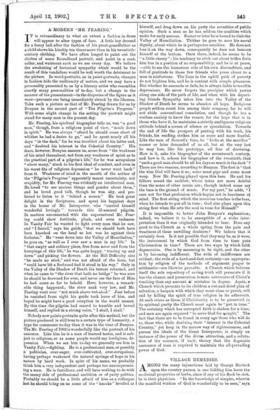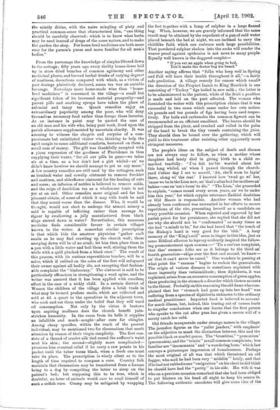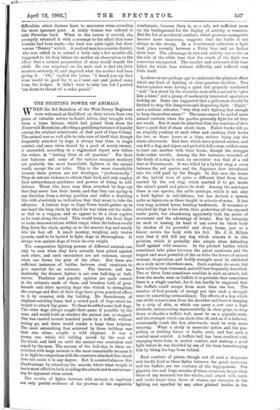VILLAGE REMEDIES.
A MONG the many injunctions laid by George Herbert 11 upon the country parson is one bidding him learn the medicinal properties of herbs, since if any of his flock be sick, he is their physician. " In the knowledge of simples, wherein the manifold wisdom of God is wonderfully to be seen," says
the saintly divine, with the naive mingling of piety and practical common-sense that characterised him, " one thing should be carefully observed : which is to know what herbs may be used instead of drugs of the same nature, and to make the garden the shop. For home-bred medicines are both more easy for the parson's purse and more familiar for all men's bodies."
From the parsonage the knowledge of simples filtered down to the cottage ; fifty years ago every thrifty house-dame laid up in store dried bunches of common agrimony and other medicinal plants, and brewed herbal drinks of varying degrees of nastiness, decoctions compared with which, as a victim of past dosings plaintively declared, senna tea was an amiable beverage. Nowadays more home-made wine than " home-
bred -medicines " is consumed in the village—a small but
significant token of its increased material prosperity—and patent pills and soothing syrups have taken the place of calamint and tansy tea. Quack remedies enjoy an extraordinary popularity among the poor, who will deny themselves necessary food rather than forego these luxuries.
As an instance in point may be quoted the case of an old man and his wife who, being past work, lived upon the parish allowance supplemented by uncertain charity. It was amusing to witness the chagrin and surprise of a com- passionate but uninitiated visitor who, thinking to help the aged couple to some additional comforts, bestowed on them a small sum of money. The gift was thankfully accepted with
a pious expression of the goodness of Providence in thus
supplying their wants, "fur all our pills be gone—we takes six at a time, so a box don't last a girt whiled—an' we
didn't know howiver we should manage to get us any moor." A few country remedies are still used by the cottagers, such as hemlock water and cowslip ointment to remove freckles and sunburn, and elderflower ointment for the healing of cuts and sores ; an infusion of nettles is believed to remove colds, and the reign of dandelion tea as a wholesome tonic is not yet at an end. Other remedies more original and far less pleasant obtain, of some of which it may with truth be said that they sound worse than the disease. Who, it would be thought, would not elect to undergo the utmost misery a cold is capable of inflicting rather than assuage its rigour by swallowing a jelly manufactured from black slugs stewed down in water? Nevertheless, this nauseous medicine finds considerable favour in certain villages known to the writer. A somewhat similar prescription is that which bids the amateur physician " gather such snails as he may find crawling up the church wall ; those creeping down will be of no avail; let him then place them in a pan with a little water and boil them well, stirring them the while with a quill plucked from a black crow." The result of this process, with its curious superstitious touches, will be a salve, which if rubbed on the soles of the feet will safeguard their owner against all bodily ills, not excepting that fashion- able complaint the " hinfooenzy." The ointment is said to be particularly efficacious in strengthening a weak spine, and the writer was assured that it has been applied with excellent effect in the case of a sickly child. In a certain district of Wessex the children of the village drive a brisk trade in what may be termed profane snails, which are collected and sold at 4d. a quart to the operatives in the adjacent town, who cook and eat them under the belief that they will ward off consumption. Not only by the virtue it bestows upon aspirin molluscs does the church benefit pain- stricken humanity. In the coom from its bells it supplies an infallible and much - sought - after cure for shingles. Among cheap specifics, within the reach of the poorest individual, may be mentioned two for rheumatism that merit attention by reason of their virgin simplicity. The first con- sists of a thread of scarlet silk tied round the sufferer's waist next his skin ; the second—slightly more complicated— promises him eventual relief if he carry a raw potato in his pocket until the tuber turns black, when a fresh one must take its place. The prescription is wisely silent as to the length of time required to compass a cure. Country folk maintain that rheumatism may be transferred from a human being to a dog by compelling the latter to sleep on the patient's bed ; but supposing this to be true, which is doubtful, no lover of animals would care to avail himself of such a selfish cure. Cramp may be mitigated, by wrapping
the feet together with a lump of sulphur in a large flannel bag. When, however, we are gravely informed that the same
result may be attained by the expedient of a pan of cold water placed beneath the bed at night, we are inclined to envy the childlike faith which can embrace such large possibilities. That powdered sulphur shaken into the socks will render the wearer proof against epidemics is not news to many people. Equally well known is the doggerel couplet—
"If you eat an apple when going to bed,
You'll make the doctor beg his bread."
Another saying affirms that "folks who keep well in Spring and Fall will have their health throughout it all,"—a fairly safe prediction. A village remedy for cancer which recalls the direction of the Prophet Isaiah to King Hezekiah is one consisting of " Turkey " figs boiled in new milk ; the latter is to be administered to the patient, while of the fruit a poultice is made and laid on the part affected. The woman who furnished the writer with this prescription claims that it was successful in two cases which came under her own notice, six pounds and ten pounds of figs having been used respec- tively. For boils and carbuncles the common figwort can be recommended as an efficient emollient. The leaves should be stripped from the plant, and crushed and rolled in the palm of the hand to break the tiny vessels containing the juice. They should then be bound over the gathering, which will yield to this treatment after resisting other apparently more stringent measures.
The people's ideas on the subject of death and disease are not always easy to follow, as when a mother whose daughter had lately died in giving birth to a child re- marked tearfully: "I've felt feeble worried about her this long whiled, an' when I passed through the church- yard t'other day I sez to meself, 'Ah, she'll soon be layin' there, along wi' the rest.' I knowed how 'twud go wi her, 'cause we be in the Lion now, an' that's anus bad fur mothers an' babies—one on 'um's boun' to die." "The Lion," she proceeded to explain, "comes round every seven years, an' we be under him this year," for which cryptic utterance Zadkiel doubtless or Old Moore is responsible. Another woman who had already been confirmed was unwearied in her efforts to secure repetitions of the rite, presenting herself as a candidate on every possible occasion. When rejected and reproved by her parish priest for her persistence, she replied that she did not see why she should not be " confirmated " as many times as she had "a mindt to be," for she had heard that " the touch of the Bishop's hand is very good for the 'elth." A hazy memory of the "King's evil" seem to linger in this idea, just as some Biblical allusion to leprosy evidently inspired the follow- ing pronouncement upon eczema :—" 'Tis a curious complaint, that thee exemus : folks sez as it belongs to the third an' fourth generation—skips over the first and second, 'ee knaw- an' that it can't never be cured." One wonders in passing at what point the " exemus " begins to reckon the generations. The origin of various diseases is sometimes explained with more ingenuity than verisimilitude ; thus diphtheria, it was explained, arises from an excessive consumption of green apples, these producing in the stomach a disorder which thence mounts to the throat. Probably on this reasoning the old dame who com. plained that her " stomach had gone up into her head" was suffering from a species of diphtheria unknown to the ordinary
medical practitioner. Imported food is believed to account for much illness, but, indeed, this tracing out of causes leads to singular conclusions when one learns that the first person who speaks to the cat after puss has given a sneeze will of a surety catch her cold.
Old friends masquerade under strange names in the village. The jaundice figures as the "yeller janders," with emphasis' on the adjective to mark the distinction between this and the possible black or scarlet genus. The " brantitus," "pamonium' (pneumonia), and the " triatic" are:all common complaints; less familiar are " insommania " and "a wandering bone," which last conveys a picturesque impression of homelessness. Perhaps the most original of all was that which threatened an old fogger, who said he had been very " ' " lately, and that if he had not rubbed some " emigration " on his chest he did think he should have had the "purity" in his side. His wife it was who on a previous occasion remarked that she had been obliged to put blisters on his head all night to keep his senses in. The following authentic anecdotes will give some idea of the
difficulties which doctors have to encounter when attending the more ignorant poor. A sickly woman was ordered to take Peruvian bark. When in due course it arrived, she promptly returned it with a message to the effect that some mistake had been made,—the bark was quite right, but there was no " Peru vy" with it. A medical man in a country district, who was called in to attend a baby only a few months old, happened to let drop before the mother an observation to the effect that a certain preparation of aloes would benefit the child. He was surprised on his next visit to find the little creature seriously ill, and inquired what the mother had been giving it. " Oh," replied the latter, " I heard you say that sloes would be good for it, so I went out and picked some from the hedges. It didn't want to take 'um, but I pushed 'urn down its throat wi' a cedar pencil."












































 Previous page
Previous page